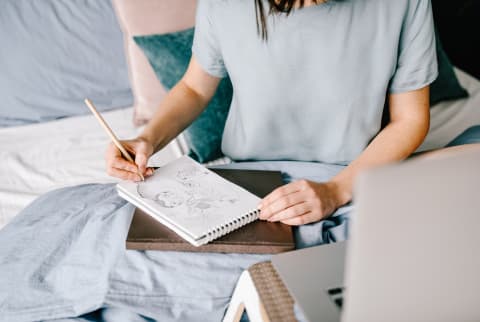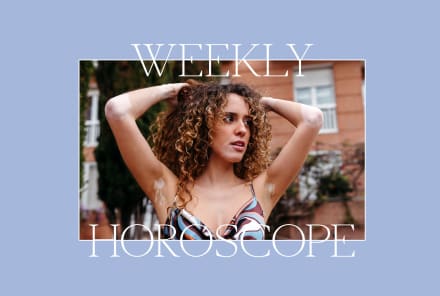Advertisement
Why Hobbies Are More Important Than Ever & How To Start One Right Now


When was the last time you used the word "hobby" to describe how you spent your free time? If it sounds like a foreign term you haven't heard since you were a kid, you're not alone: Hobbies are something of a lost art in our culture today. In a world that celebrates the "hustle" of answering emails until midnight, creativity and hobbies often fall by the wayside.
But, needless to say, our world is changing right now. Coronavirus is keeping us away from our normal schedules, and we now have more "free" time than before. This shift can leave us feeling bored, anxious, and confused—or it can serve as the nudge we need to question the hustle mentality and reconnect to our innate creativity.
The key to starting a new hobby? Slowing down long enough to access your creative side.
Every single human is born creative, according to neuroscientist and adjunct professor at Stanford University David Eagleman, Ph.D. In his new special, The Creative Brain, Eagleman says, "creativity is our biological mandate. A wild imagination characterizes the history of our species... We surround ourselves with things that have never existed before, while pigs and llamas and goldfish do not."
The trick to picking up a hobby is to step out of efficiency and productivity mode and create just for the sake of creating. And you can start right now.
3 simple tips to start developing creative hobbies from the comfort of your own home:
1. Get curious about how you spend your free time right now.
Before we can make any changes, we need to analyze our current habits. In a compassionate, curious way, reflect on how you usually spend your downtime: Do you try to fill it answering emails? Or do you turn off right when you get home and immediately zone out on the couch? Neither of these habits is "right" or "wrong," but it's important to get a feel for them so you can understand where the shift needs to happen.
For example, up until last year, my fiancé and I didn't think we had time for creative hobbies. Our schedules were packed, and the "free" time we did have, we spent putting it back into our work. Even though we both led extremely healthy lives (or so we thought), our brains were constantly on and looking for shortcuts. We ordered groceries delivered straight to our door and opted for intense HIIT-style workouts to save time. The more we could get done in a day, the better. But one day, we looked at how we were spending our downtime and realized something was missing. We didn't have a habit we simply enjoyed for pure fun.
Fast-forward and we have started a business that allows adults to build creative hobbies. Now, we refer to our old after-work habits (dozing off watching Netflix or scrolling through our phones) as "low-quality leisure." These activities made us feel drained afterward, and oftentimes we did them unconsciously. Once we had a clear understanding of how we spent our time, we could begin to take action.
2. Start small, but experiment with things out of your comfort zone.
Once you analyze your old habits, it's time to start replacing them with a new creative medium. It doesn't necessarily matter what creative hobby you choose to try, so long as it's different from what you do in your everyday life. That's because engaging in low-barrier creative hobbies that are unrelated to your normal day-to-day actually helps your brain work better, according to Drexel professor and art therapy expert Girija Kaimal, M.A., EdD. In a research paper on art therapy1, she writes "the ability to make connections between unrelated things and imagine new ways to communicate is good for you. Art-making helps us navigate the future." So if you spend your days writing for your job, you might try your hand at something like embroidering or cooking.
Starting new activities is easy for some people, but sticking with them can be an entirely different story. To start, set an achievable goal for yourself like painting once a week instead of becoming an all-star painter. Remember, hobbies are supposed to be fun, not your next side-hustle. The science of neuroplasticity tells us that over time, our brain can start to rewire itself to make that activity more natural for us to carry out.
3. Remember that hobbies aren't meant to be perfect.
In our world today, we're so focused on achievement that we forget how important it is to simply experience joy. But joy is one of the most important feelings we can channel—especially when we're overwhelmed—because it's such an accessible version of positivity. By collecting these "small moments that make us feel more alive," we perceive our lives as happier on the whole, according to an Aspen Institute talk led by designer Ingrid Fetell Lee.
So, next time you catch yourself trying to become the next Top Chef when you're experimenting in the kitchen, or you feel the need to perform for your Instagram audience when you try your hand at woodworking—take a step back. Question what your intention is, and reassess your "why."
We can all use a little bit more creation and a little less curation—in every part of our lives. It starts with practicing joy through the hobbies we pick up, straight from our couch.
Watch Next
Enjoy some of our favorite clips from classes
Enjoy some of our favorite clips from classes
What Is Meditation?
Mindfulness/Spirituality | Light Watkins
Box Breathing
Mindfulness/Spirituality | Gwen Dittmar
What Breathwork Can Address
Mindfulness/Spirituality | Gwen Dittmar
The 8 Limbs of Yoga - What is Asana?
Yoga | Caley Alyssa
Two Standing Postures to Open Up Tight Hips
Yoga | Caley Alyssa
How Plants Can Optimize Athletic Performance
Nutrition | Rich Roll
What to Eat Before a Workout
Nutrition | Rich Roll
How Ayurveda Helps Us Navigate Modern Life
Nutrition | Sahara Rose
Messages About Love & Relationships
Love & Relationships | Esther Perel
Love Languages
Love & Relationships | Esther Perel

















